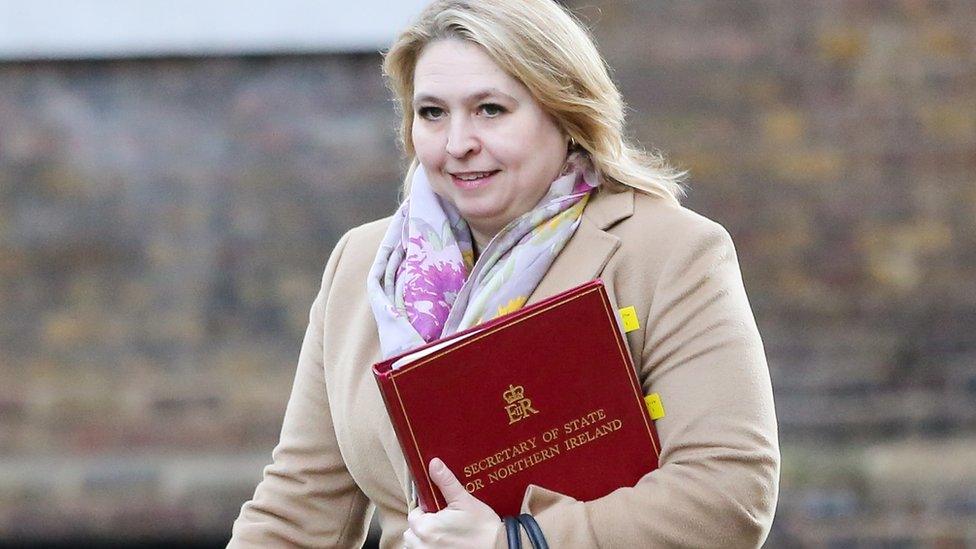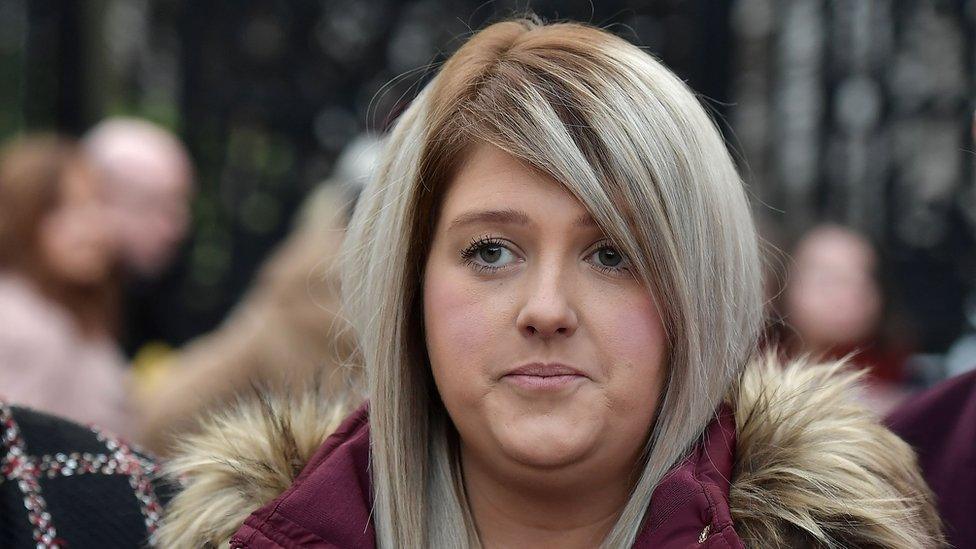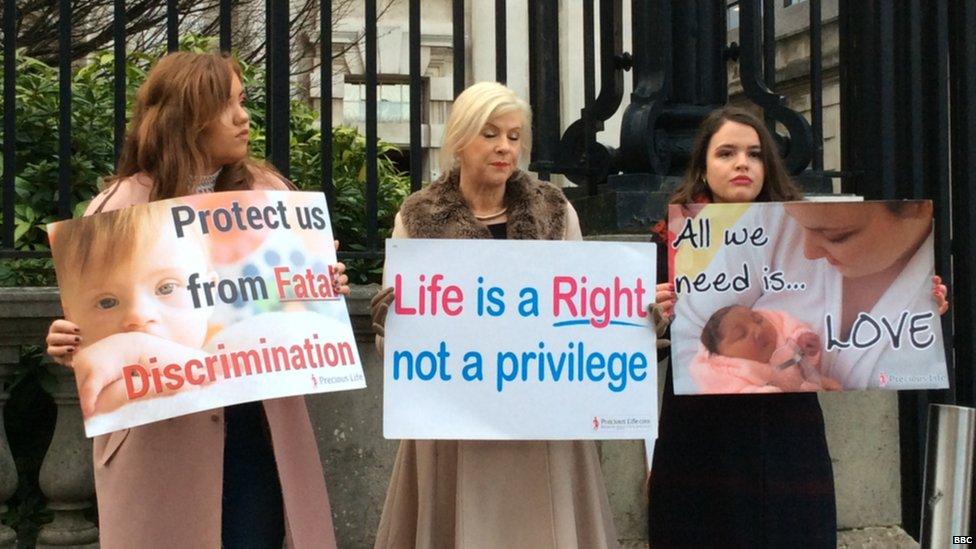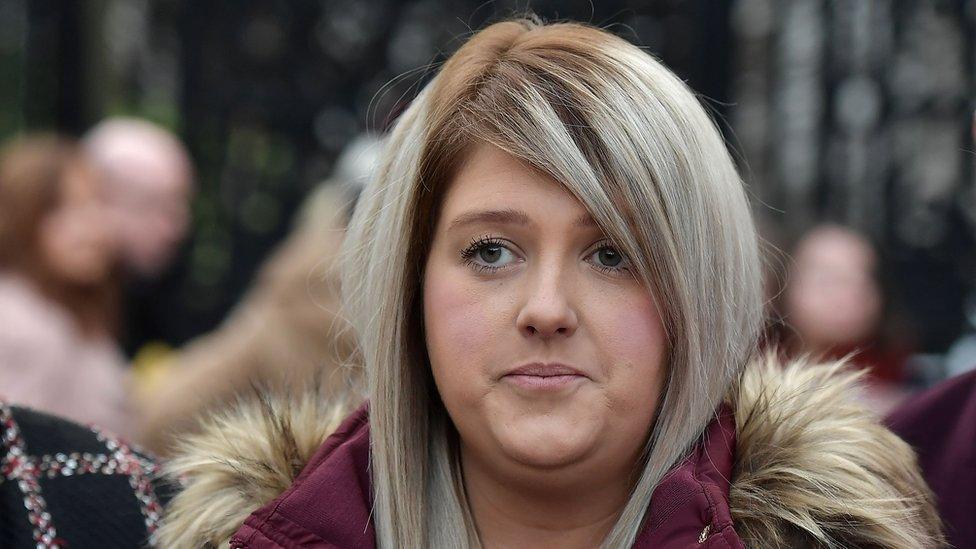Karen Bradley to fix legal 'error' after abortion case
- Published

Karen Bradley was speaking at the Commons Women & Equalities Committee
Karen Bradley has told a committee she plans to legislate to give the NI Human Rights Commission legal standing to act in cases like last year's Supreme Court challenge to abortion laws.
She told the committee that legislation is required to rectify "an error" when the commission was created.
The commission lost an appeal over the legality of NI's abortion law in June.
It lost on the issue of whether it had the required legal standing to bring the case.
The Northern Ireland secretary comments came in response to a question from Labour MP Jess Phillips at Westminster's Women and Equalities Committee.
Ms Phillips wanted to know if it would require a woman or child who has been raped to take a legal challenge while still pregnant before the abortion laws in Northern Ireland can be reformed.
Earlier, Mrs Bradley repeated her view that she would like to see a change in the law on abortion in Northern Ireland
She told the committee that the Executive Formations and Exercise of Functions Act passed in October allows the executive to reform at any time and because of that "I, as the secretary of state have no executive powers to direct the civil service".

Timeline of NI abortion law challenges
30 November 2015: A High Court judge in Northern Ireland rules Northern Ireland's law breached the European Convention on Human Rights in cases of fatal foetal abnormality or sexual crime
11 February 2016: Members of the Northern Ireland Assembly vote against legalising abortion in cases of fatal foetal abnormality (by 59 votes to 40) and cases of sexual crime (by 64 votes to 30)
14 June 2017: Supreme Court rejects an appeal by an anonymous mother and daughter that NI women should be able to access free NHS abortions in England
29 June 2017: Northern Ireland's Department of Justice (DoJ) and Attorney General successfully appeal against 2015 High Court human rights ruling, prompting the NIHRC to go to the Supreme Court
29 June 2017: The government announces women from Northern Ireland will be entitled to free NHS abortions in England, after a Labour-led campaign
25 October 2017: Supreme Court considers appeal that argues Northern Ireland law is incompatible with international human rights

She acknowledged to the committee that this was "frustrating" but said "that is the reality of the legal position."
Questioned by Ms Phillips as to how the law on medicinal cannabis could have been changed in Northern Ireland within the same time period, Mrs Bradley explained that it was possible as drugs policy is not a devolved matter.
Conservative MP Eddie Hughes asked Mrs Bradley about the consequences of the 1967 Abortion Act never having been introduced in Northern Ireland and whether that was "a good thing".
Mrs Bradley said it was a "subjective matter" but she had been clear that she "would like to see a change in law in NI".
Supreme Court judgement
In June, a majority of judges on the Supreme Court ruled that the existing law on abortion in Northern Ireland was incompatible with human rights law in cases of fatal foetal abnormality and sexual crime.
But the court dismissed the NI Human Rights Commission's appeal on the technical grounds that the commission did not have the necessary legal standing to bring its case.

Sarah Ewart was denied an abortion in 2013, despite doctors saying her baby would not survive outside the womb
For this reason, the Supreme Court did not make a formal declaration that the law in Northern Ireland is incompatible with the UK's human rights obligations.
A Belfast woman who travelled to England to get a termination after being diagnosed with a fatal foetal abnormality six years ago is currently taking a court challenge in relation to the matter.
Court ruling 'highly persuasive'
Asked how long the UK government was prepared to allow the current situation to persist, Mrs Bradley repeatedly emphasised that her focus is on trying to restore devolution at Stormont.
The committee's chair Maria Miller put it to Mrs Bradley that the current legal regime regarding abortion is failing women in Northern Ireland and putting their health at risk.
Ms Miller asked Mrs Bradley if she did not regard that as genuinely urgent.

Anti-abortion campaigners protested outside court in June
Mrs Bradley declined to outline any timescale on her consideration of whether to intervene over the abortion issue.
But she told MPs the UK government would regard a ruling by the European Court on Human Rights as binding and a formal declaration of incompatibility by the UK Supreme Court as "highly persuasive".
Mrs Bradley said changing the legal standing of the Northern Ireland Human Rights Commission would require primary legislation but the Northern Ireland Office would act at the earliest opportunity.
Why is the law different in Northern Ireland?
The 1967 Abortion Act, which liberalised the rules in Great Britain, was never extended to Northern Ireland.
Currently, a termination is only permitted in Northern Ireland if a woman's life is at risk or if there is a risk of permanent and serious damage to her mental or physical health.
Rape, incest or diagnoses of fatal foetal abnormality (FFA) - where medics believe that a baby will die before, during or shortly after birth - are not grounds for a legal abortion in Northern Ireland.
However, anti-abortion campaigners argue that doctors cannot reliably predict the timescale of death and they point to several cases where babies have defied the prognosis and survived into adulthood.
The law on abortion in Northern Ireland explained
- Published30 January 2019

- Published7 June 2018
